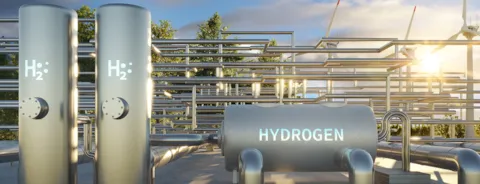DNV embarks on groundbreaking hydrogen blending feasibility study to decarbonize gas system in British Columbia
DNV is executing hydrogen blending feasibility studies for Enbridge, Inc. (Enbridge) and FortisBC Energy Inc. (FortisBC). The two individual studies will determine the percentage of hydrogen that can be safely transported through existing natural gas pipeline infrastructure, including Enbridge’s transmission system and FortisBC’s distribution system, both located in British Columbia, Canada. These studies, which are the largest blending studies undertaken in North America, will be used to develop the codes and standards required to safely transport hydrogen as the first step in forming a sustainable commercial hydrogen market.
The project is part of the Province of British Columbia’s work to reduce greenhouse gas emissions by decarbonizing FortisBC's and Enbridge's natural gas systems while maintaining safety, reliability, and affordability. Individual studies will be undertaken for both sets of assets, recognizing the unique components and systems in place. Collectively, the studies will build a knowledge base to establish the safety, technical, and economic requirements needed to identify and introduce the best and safest hydrogen concentration levels for the system. The entire gas supply value chain will be examined, from hydrogen injection points to end-user delivery points on the pipeline systems.

region president,
Energy Systems
North America, DNV
“Blending clean hydrogen with natural gas is a key step in the energy transition, and the work DNV is undertaking for Enbridge and FortisBC will help to decarbonize the energy supply in British Columbia and provide a framework for future hydrogen blending projects globally,” said Richard S. Barnes, region president, Energy Systems North America at DNV.
When injected into the natural gas grid or distributed into new or converted infrastructure, hydrogen can be a renewable and low-carbon fuel to reduce greenhouse gas emissions and develop a low carbon-energy economy. These studies are the next phase in a multi-year development effort as part of FortisBC and Enbridge’s long-term strategy to establish and maintain leadership in the low-carbon and green energy sector.
“At Enbridge, we are working hard to reduce our greenhouse gas emissions and the carbon intensity of the energy we transport," said Cynthia Hansen, Enbridge Executive Vice President and President, Gas Transmission and Midstream. "One way we're doing this is by using our existing energy infrastructure to transport low-carbon forms of energy such as hydrogen. This important study will play a critical role in determining how existing energy infrastructure can be used to transport hydrogen and how we can continue to work to advance the energy transition.”
“FortisBC recognizes that we have a critical role to play in helping our customers reduce greenhouse gas emissions by providing new energy options that can be delivered safely and reliably through our existing gas system. Our long-term vision is to have hydrogen be part of our renewable and low-carbon gas supply, and collaboration with industry and government in research such as this is a pivotal step toward finding the safest way of making that vision a reality,” said Roger Dall'Antonia, president and CEO, FortisBC.
DNV is actively contributing to the advancement of clean hydrogen adoption through several initiatives:
- Joint industry projects (JIPs): DNV is leading five JIPs that specifically target hydrogen. These collaborative efforts involve industry stakeholders and aim to drive innovation and best practices in hydrogen-related activities.
- Verification procedure for low-carbon hydrogen claims: DNV has recently introduced DNV-SE-0654 to verify claims related to the production and distribution of low-carbon hydrogen and ammonia. This ensures transparency and credibility in the industry.
- Guidance for hydrogen transportation in pipelines: DNV has developed guidelines for the safe and efficient transportation of hydrogen through pipelines to adress technical, safety, and regulatory aspects, as well as the DNV-SE-0657 service specification for the re-qualification of pipeline systems for transport of hydrogen and carbon dioxide.
These activities play a crucial role in shaping the future of hydrogen by promoting safety, infrastructure development, decarbonization, and policy support.
